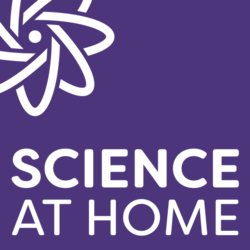ScienceAtHome
ScienceAtHome is a team of scientists, game developers, designers and visual artists based at Aarhus University, Denmark. ScienceAtHome does research on quantum physics, citizen science and gamification. ScienceAtHome also develops games that contribute to scientific research, and studies how humans interpret information to achieve results superior to some algorithmic approaches.
 | |
Type of site | Citizen science web portal |
|---|---|
| Available in | English |
| URL | www |
| Commercial | No |
| Current status | Online |
Most ScienceAtHome games are casual games and require no formal scientific training. Over 150,000.[1] people have contributed to ScienceAtHome citizen science projects by playing games. Research games are also part of a much larger movement of creating serious games that go beyond mere entertainment.
The premise behind such games is that humans are better than computers at performing certain tasks, because of their intuition and superior visual processing. Video games are now being used to channel these abilities to solve problems in quantum physics.[2] Result from the flagship game, Quantum Moves have been published in scientific magazine, Nature.
“A computer goes through all available pathways the atom can move, whereas people search for solutions that intuitively feel right”– said game development leader Dr Jacob Sherson, associate professor in the Department of Physics and Astronomy at Aarhus.[3]
History
The idea of computer players solving quantum problems came to Jacob Sherson’s mind while he was doing research at Johannes Gutenberg University, Mainz, in the group of Prof. Immanuel Bloch. The first form of ScienceAtHome was announced in 2012 based on the idea that computer game players could solve quantum problems. It was then called CODER - “Pilot Center for Community-driven Research: Game Assisted Quantum Computing” - and it started with a game called Quantum Computer Game. CODER later grew and evolved into ScienceAtHome, and the Quantum Computer Games was renamed as Quantum Moves.[4]
Publications
ScienceAtHome appeared in both national and international press several times. It has been featured in The Wall Street Journal,[5] The Washington Post, LA Times,[6] The New Yorker,[7] The Sydney Morning Herald and the BBC[8]
Jacob Sherson gave a speech at TEDxAarhus 2016 called “How to become a quantum physicist in five minutes”.[9]
Pinja Haikka, Postdoctoral Researcher in Theoretical Physics, also introduced ScienceAtHome at Women in Science event at Aarhus University, which was published at local television ITV OJ.[10]
Projects
Games
| Project | Type | Description | Platform | Link |
|---|---|---|---|---|
| Alice Challenge | Quantum Physics | The Alice Challenge is to find the optimal cooling process of an atom cloud—the end goal is to have the largest possible amount of cold atoms in a trap after several cooling sequences. | Windows | |
| Alien CODE | Social Science | In the Alien CODE, you need to find the right solution to the Alien puzzle. The solution which gives you a higher score will be the basis for subsequent moves, until you use the 'I'm feeling lucky' option. | Browser | |
| Quantum Minds | Cognitive Science, Quantum Physics | Quantum Minds studies the human learning process as a player encounters gamified quantum physics problems. The goal of Quantum Minds is to play through four levels of increasing difficulty. To unlock the next level, you must complete the current three times in a row. | Windows, OSX | |
| Quantum Moves | Quantum Physics | Quantum Moves is the first gamified citizen science project of ScienceAtHome. The mouse movements simulate laser beams used in the real quantum experiment to move atoms along optimal pathways. | Windows, OSX, Linux, iOS, Android | |
| Skill Lab: Science Detective | Cognitive Science, Social Science | Skill Lab: Science Detective is a collection of mini-games that challenge players in various different ways. ScienceAtHome team tracks your performance across a variety of tasks and map your core gaming skills to better understand how this affects your performance in other games. | Browser, iOS, Android | |
| Network Game | Quantum Physics, Computer Science (Demo) | The Network Game helps ScienceAtHome figure out how humans approach solving some of the most difficult computational problems. | Browser | |
| Potential Penguin | Physics, Education | Potential Penguin helps ScienceAtHome find out how visualization helps in learning physics concepts and what improves the performance in other quantum games. | Browser | |
| Rydbergator | Physics, Education | Rydbergator is a game and a simulator where atoms are interacting. | Browser | |
| Turbulence | Physics, Education | Helps research in turbulence which is the chaotic changes in pressure and velocity. | Not available to play | |
| Crystal Crop Fever | Physics, Education | Research in human problem-solving behavior in an optimization task. | Coming soon |
References
- "Forsker vil tage eksistensberettigelsen fra Videnskab.dk".
- "Physics: Quantum problems solved through games".
- "Gamers help solve quantum questions".
- "Computerspillere skal løse kvantegåde".
- "Videogamers Are Recruited to Fight Tuberculosis and Other Ills".
- "Take that, A.I.: Video-gamers solve quantum physics mystery using human intuition".
- "Better research through video games".
- "Quantum Games".
- "TEDxAarhus 2016 Speakers - Jacob Sherson".
- "Pinja Haikka, Women in Science Day speech".